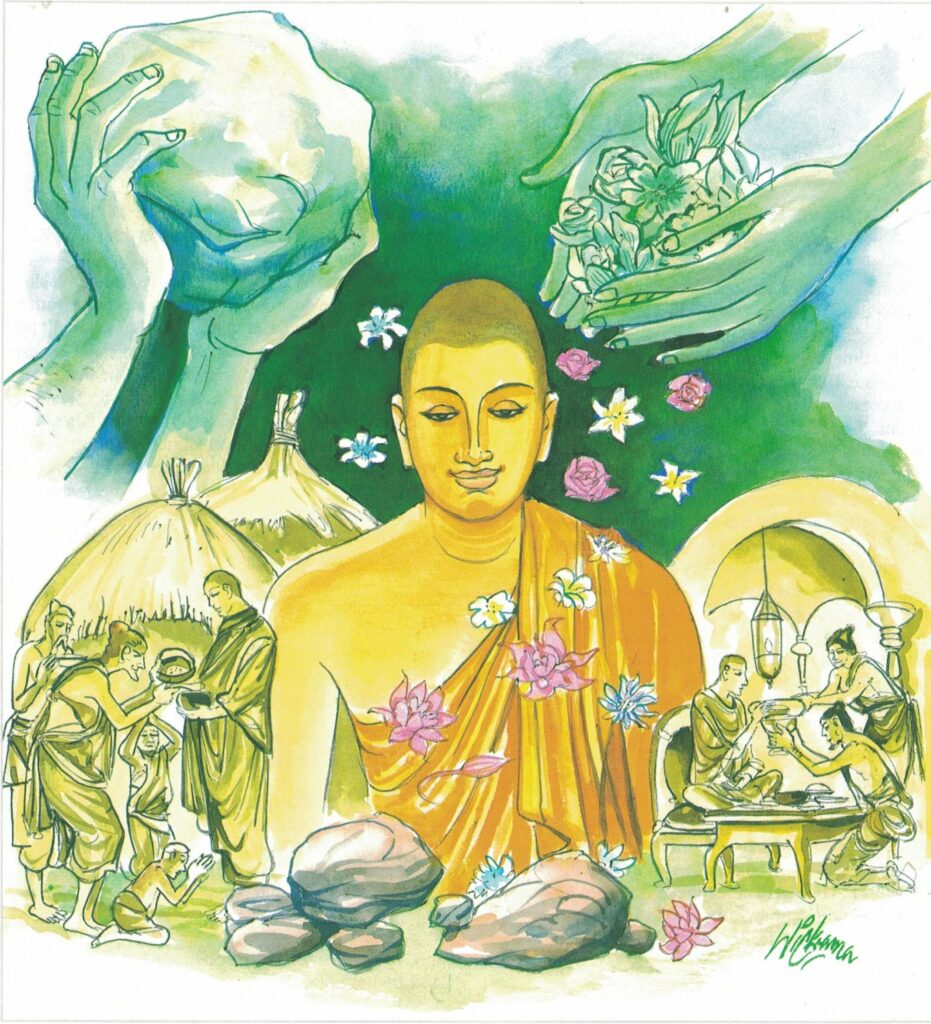Pali text, illustration and English translation of Dhammapada verse 83:
sabbattha ve sappurisā cajanti na kāmakāmā lapayanti santo |
sukhena phuṭṭhā atha vā dukhena noccāvacaṃ paṇḍitā dassayanti || 83 ||
83. Everything the good renounce, the peaceful chatter not of fond delights, and whether touched by pleasure or pain not joy nor woe in the wise is seen.

The Story of Kānamātā
While residing at the Jetavana Monastery, the Buddha spoke this verse, with reference to a group of monks.
At the request of a Brāhmin from Verañjā, the Buddha was, on one occasions, staying at Verañjā with a group of monks. While they were at Verañjā, the brāhmin failed to look after them. The people of Verañjā, who were then facing a famine, could offer very little to the monks when they went on their alms-round. In spite of all these hardships, the monks were not disheartened; they were quite contented with the small amount of shrivelled grain which the horse-traders offered them daily. At the end of the vassa (rainy season), after informing the brāhmin from Verañjā, the Buddha returned to the Jetavana Monastery, accompanied by the monks. The people of Sāvatthi welcomed them back with choice food of all kinds.
A group of people living with the monks, eating whatever was left over by the monks, ate greedily like true gluttons and went to sleep after their meals. On waking up, they were shouting, singing and dancing, thus making themselves a great nuisance. When the Buddha came in the evening to the congregation of monks, they reported to him about the behaviour of those unruly persons, and said, “These people living on the left-overs were quite decent and well-behaved when all of us were facing hardship and famine in Verañjā. Now that they have enough good food they are going about shouting, singing and dancing, and thus make themselves a great nuisance. The monks, however, behave themselves here just as they were in Verañjā”.
To them the Buddha replied, “It is in the nature of the foolish to be full of sorrow and feel depressed when things go wrong, and to be full of gladness and feel elated when things go well. The wise, however, can withstand the ups and downs of life.”
Explanatory Translation (Verse 83)
sappurisā ve sabbattha cajanti santo kāmakāmā na lapayanti
sukhena phuṭṭhā athavā dukhena paṇḍitā uccāvacaṃ na dassayanti
sappurisā: noble ones; ve sabbattha: certainly in all things; cajanti: are non-attached; santo [santa]: the noble ones; kāmakāmā: desiring sensual things; na lapayanti: do not talk; sukhena: by happiness; phuṭṭhā: touched; athavā: or else; dukhena: by misery (touched); paṇḍitā: wise ones; uccāvacaṃ [uccāvaca]: a fluctuation; na dassayanti: do not display
The noble and wise persons are not attached to anything whatsoever in the world. The disciplined persons do not talk desiring worldly things, material benefits or sensual delights. Whatever fortune or ill fortune may touch them, they remain calm, neither depressed nor elated.
Commentary and exegetical material (Verse 83)
sukhena dukkhena: the wise remain undisturbed both in pleasure and in pain. Pleasure and pain are a pair of opposites. They are the most powerful factors that affect mankind. What can be endured with ease is sukha (pleasure), what is difficult to bear is dukkha (pain). Ordinary happiness is the gratification of a desire. No sooner the desired thing is gained then we desire some other kind of pleasure. So insatiate are our selfish desires. the enjoyment of sensual pleasures is the highest and only happiness to an average person. No doubt there is a momentary happiness in the anticipation, gratification and recollection of such sensual pleasures, highly priced by the sensualist, but they are illusory and temporary.
Real happiness is found within, and is not to be defined in terms of wealth, power, honours or conquests.